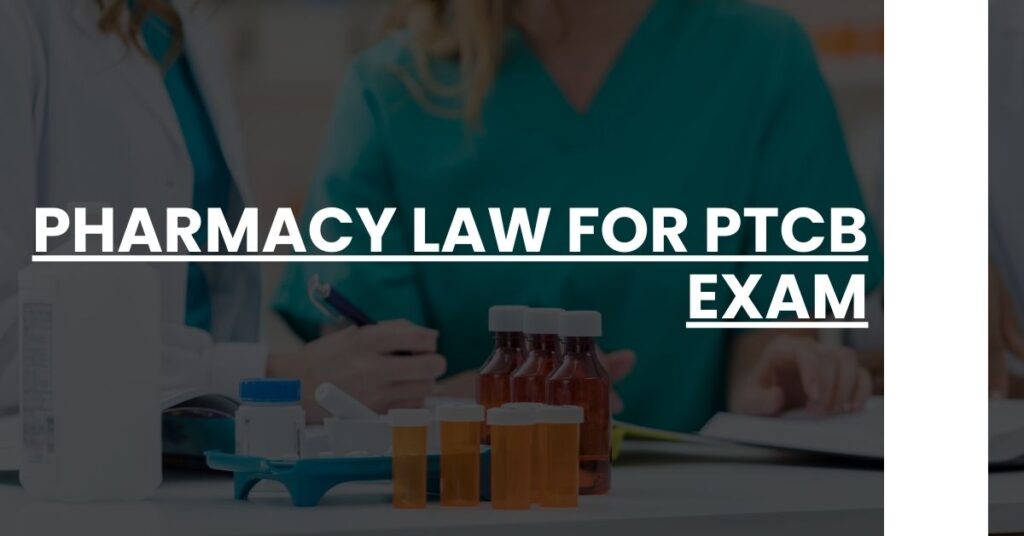Mastering Pharmacy Law for PTCB Exam ensures your success as a pharmacy technician.
- Comprehensive Understanding: Grasp the critical aspects of pharmacy law, laying the foundation for effective practice and exam readiness.
- Regulatory Compliance: Learn the must-know federal regulations that govern the pharmacy field.
- Ethical Standards: Embrace the ethical principles that underpin patient confidentiality and trust.
A solid grasp of Pharmacy Law for PTCB Exam is indispensable.
- Understanding the PTCB and Its Emphasis on Pharmacy Law
- Key Areas of Pharmacy Law for the PTCB Exam
- Federal Regulations Governing Pharmacy Practice
- The Role of the FDA and DEA in Pharmacy
- Ethics and Patient Confidentiality
- How to Study Pharmacy Law for the PTCB Exam
- Practice Questions and Case Studies
- Staying Updated with Changing Pharmacy Legislation
- Conclusion: The Importance of Law in Pharmacy Technician Certification
Understanding the PTCB and Its Emphasis on Pharmacy Law
The Pharmacy Technician Certification Board (PTCB) plays a pivotal role in the certification and qualification of pharmacy technicians. This organization sets the standard for what it takes to be a successful pharmacy technician, emphasizing not only the pharmacological knowledge and customer service skills but also a profound understanding of pharmacy law.
The Role of Pharmacy Law in PTCB Certification
Pharmacy law encompasses the regulations and legal guidelines that govern the pharmaceutical industry. For pharmacy technicians, knowledge of these laws is essential for several reasons:
- Ensures Patient Safety: Understanding pharmacy law is critical in maintaining patient health and safety, which is the topmost priority in the pharmacy field.
- Mitigates Legal Risks: It helps pharmacy personnel adhere to legal standards, thus minimizing the risk of legal repercussions due to non-compliance.
- Supports Professional Ethics: Pharmacy law underpins the ethical framework within which pharmacy professionals operate.
For the PTCB exam, candidates must demonstrate their knowledge of pharmacy law as it is integral to their daily responsibilities and ethical decision-making within the pharmacy setting.
Importance in the PTCB Exam
The PTCB exam tests candidates on several areas of pharmacy expertise, including pharmacy law and regulations, as these are paramount in guiding the practice within the field. This portion of the exam assesses the candidate’s ability to:
- Comprehend the scope of practice
- Understand compliance with regulatory bodies
- Maintain the required documentation
- Ensure patient privacy and confidentiality
The emphasis on pharmacy law isn’t just about passing the exam; it’s about preparing pharmacy technicians for the real-world situations they will encounter on the job. It endows them with the capability to handle sensitive situations ethically and legally.
Key Areas of Pharmacy Law for the PTCB Exam
Pharmacy law is an umbrella term that includes a variety of topics, all of which are important for the PTCB exam. Here’s an overview of some of the crucial areas that candidates need to focus on:
Federal Pharmacy Law
Includes overarching legislations such as the Food, Drug, and Cosmetic Act and the Controlled Substances Act, which set regulations on the handling, dispensing, and recording of medications.
State Pharmacy Law
Comprises laws specific to individual states or regions, which sometimes have more stringent regulations than federal laws.
Pharmacy Ethics
Apart from laws, ethical guidelines play an important role, addressing issues such as patient confidentiality and conflicts of interest.
Regulatory Organizations
An understanding of the role and requirements of regulatory bodies such as the State Boards of Pharmacy is required.
Broadly speaking, these are aspects of pharmacy law that will be assessed in some form during the PTCB exam, and thus should be a key focus in any study plan.
Federal Regulations Governing Pharmacy Practice
One cannot overstate the importance of federal regulations in pharmacy practice. These laws form the foundation for how medications are handled, prescribed, and dispensed.
The Controlled Substances Act (CSA)
The CSA is the statute prescribing federal U.S. drug policy under which the manufacture, importation, possession, use, and distribution of certain narcotics, stimulants, depressants, hallucinogens, anabolic steroids, and other chemicals is regulated.
- Scheduling of Drugs: All pharmacy professionals must have a thorough knowledge of the five drug schedules and associated restrictions.
The Food, Drug, and Cosmetic Act (FDCA)
This act provides the basis for FDA regulations regarding the safety and efficacy of drugs, medical devices, and food additives. Key provisions include:
- New Drug Approval: Understanding the protocol of drug trials and marketing.
- Adulteration and Misbranding: Recognizing violations pertaining to purity, packaging, and labeling.
Health Insurance Portability and Accountability Act (HIPAA)
HIPAA is crucial for any pharmacy technician to comprehend as it safeguards patient privacy and outlines the acceptable use of medical information.
- Protected Health Information (PHI): Pharmacy personnel must know what constitutes PHI and how it should be protected.
- Patient Rights: This includes the rights of patients to access and amend their health records and to authorize disclosures.
A solid grasp of these federal regulations is vital because they directly influence the daily operations of a pharmacy and are extensively covered in the PTCB exam.
The Role of the FDA and DEA in Pharmacy
The FDA and DEA are critical agencies in the pharmacy landscape, each playing a unique role in the regulation and enforcement of pharmacy practices.
Food and Drug Administration (FDA)
The FDA regulates over-the-counter and prescription drugs, including biological therapeutics and generic drugs. For the PTCB exam, knowledge of the following is critical:
- Drug Approvals and Recalls: The processes by which drugs are approved for the market or recalled.
- Manufacturing Practices: Understanding of Good Manufacturing Practices that ensure the quality of drug production.
Drug Enforcement Administration (DEA)
The DEA enforces the CSA and combats drug trafficking. Pharmacy technicians need to know:
- DEA Registration: Every pharmacy must have a DEA number to dispense controlled substances.
- Record Keeping and Documentation: Accurate recordkeeping of controlled substances is mandated by the DEA.
These agencies apply strict protocols to ensure that the pharmacy operates within the law. Their role is crucial for all pharmacy personnel and forms a significant part of the PTCB exam content involving pharmacy law. Understanding and adhering to the frameworks set forth by the FDA and DEA not only assure professional compliance but also guarantee the protection of patients’ well-being.
Navigating the intricacies of these agencies’ expectations is crucial not only for pleaseing the exam but for excelling in one’s pharmacy career.
Ethics and Patient Confidentiality
At the heart of pharmacy practice lies a framework of ethical standards and principles, safeguarding patient confidentiality and instilling trust within the healthcare community. For the PTCB exam, it is crucial that pharmacy technicians demonstrate a clear understanding of ethical conduct and the legislation that enforces it.
Balancing Transparency and Privacy
Ethics in pharmacy encompasses more than following the law—it requires a moral compass that guides technicians through complex situations. The privacy of patient information, underscored by healthcare regulations like HIPAA, demands a confidential approach to patient interactions and records. This extends to both the personal details and the health data of individuals entrusted to the pharmacy’s care.
- Professional Discretion: Knowing when and how to share patient information is pivotal. Pharmacy technicians must navigate between necessary disclosures for healthcare purposes and unwarranted invasions of privacy.
- Legal Implications: There are legal consequences for breaching confidentiality. PTCB candidates should understand the severe implications of unethical conduct, which can lead to penalties and loss of licensure.
In grasping the ethical aspects of pharmacy law for the PTCB exam, examinees ensure they are equipped to uphold the standards expected of them in their professional roles.
How to Study Pharmacy Law for the PTCB Exam
Preparing for the PTCB exam necessitates a strategic approach to learning complex legal concepts and their practical applications. The following strategies will facilitate an effective and comprehensive study experience:
- Structured Study Plan: Develop a roadmap of topics, dedicating time to each area of pharmacy law. This systematic approach will help you cover all necessary content without becoming overwhelmed.
- Consistent Review: Regularly revisit key concepts to reinforce understanding. Spaced repetition is proven to enhance memory retention.
- Practical Scenarios: Engage with real-world case studies to contextualize legal principles. By applying the law to practical pharmacy situations, the information becomes more tangible and memorable.
- Resource Utilization: Lean on a variety of resources, from textbooks to online courses, ensuring a well-rounded comprehension of legal standards.
For a deeper exploration of pharmacy law topics and case studies, consider visiting resources like Case Studies in Pharmacy Ethics to immerse yourself in practical ethical dilemmas you might face as a pharmacy technician.
Practice Questions and Case Studies
Delving into practice questions and case studies is an unbeatable method of preparing for the PTCB exam’s legal aspects. This practical application of knowledge enables examinees to visualize the implementation of pharmacy law for the PTCB exam in a real-world context.
- Exposure to Varied Scenarios: By testing yourself with different case studies, you’ll be exposed to a wide range of potential situations you may encounter within the pharmacy setting.
- Application of Law to Practice: Practicing with real-life scenarios helps bridge the gap between theoretical knowledge and practical application.
A wealth of study materials, including the aforementioned Case Studies in Pharmacy Ethics, offers invaluable insight into potential ethical conundrums a pharmacy technician may face, heightening preparedness for both the exam and the pharmacy workplace.
Staying Updated with Changing Pharmacy Legislation
Laws affecting the pharmacy industry are dynamic and subject to change. As a pharmacy technician, it is essential to stay abreast of legislative updates to maintain a lawful practice. The following strategies are valuable for keeping current with evolving regulations:
- Continuing Education: Commit to ongoing learning through courses and webinars focused on legal updates in the pharmacy sector.
- Professional Networking: Engage with industry peers and regulatory bodies. Interactions with these resources can alert you to legislative changes and interpretations in practice.
- Regular Reading: Stay informed by reading industry publications and following the legislative websites, such as with the latest updates provided by Tennessee’s Pharmacy Board.
An ongoing commitment to educational growth in pharmacy law is not just beneficial for exam success, but it is also a professional responsibility for all pharmacy technicians.
Conclusion: The Importance of Law in Pharmacy Technician Certification
In conclusion, as a current or aspiring pharmacy technician, comprehending pharmacy law for the PTCB exam is a paramount objective. This knowledge not only ensures your success in the exam but stands as a cornerstone of your professional development within the pharmacy field. By prioritizing this aspect of your preparation, you equip yourself with the tools to make informed decisions that safeguard patient safety and adhere to high standards of legal and ethical practice.
Remember, mastery over pharmacy law is not just about passing the PTCB exam—it’s an investment in your career and the health of the community you serve. As such, treating the study of pharmacy law as a continuous journey rather than a final destination will serve you well in the long-term landscape of your professional pharmacy endeavors.

